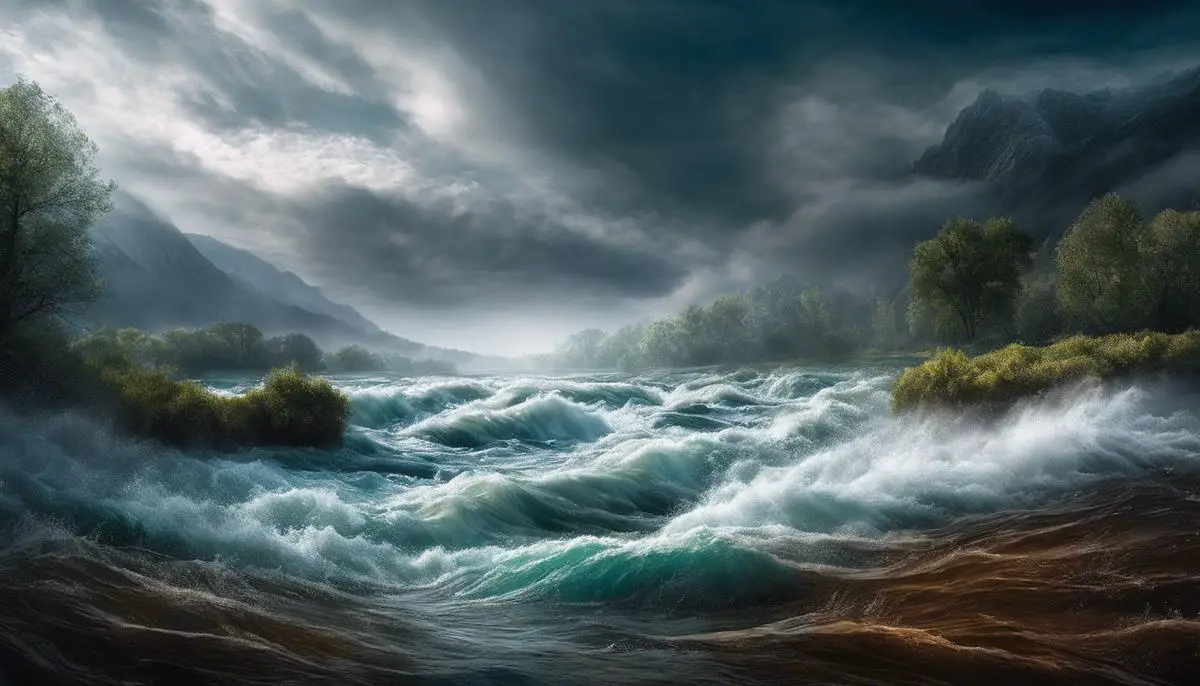Dreams have long been considered as the reflections of our subconscious thoughts and emotions. This idea is firmly entrenched in the philosophical traditions stemming from psychoanalysis pioneered by Freud and expanded upon by Jung. Essentially, dreams act as mirrors, revealing not only the secrets of our psyche but also helping to resolve complicated emotions and experiences. When dream narratives involve elements such as water or floods, the symbolism becomes all the more potent and intriguing. This essay is structured to unravel the psychology behind such flood dreams and dwell deeper into the symbolic significance of water in dreams.
Dreams as reflection of psychological state
The Reflection of Our Emotional and Psychological State in Dreams: A Discourse on The Internal Mind Symphony
As sentient beings, humans possess an intricate and frequently baffling ability to navigate an array of emotional and cognitive experiences. Unraveling this deep-rooted labyrinth has precipitated fascinating discourses within the scientific community. This article delves into one such captivating dialogue—the insightful symbiosis between our dreams and our emotional and psychological state.
Dreams, the often elusive scenarios played out during sleep, extend beyond mere Freudian narratives of suppressed urges and desires. They are, indeed, manifestations of our mental and emotional health, acting as a mirror for our deeper consciousness.
In the broad spectrum of dream studies, or oneirology, it is often contended that dreams can serve as a reflection of subconscious thoughts and feelings. Empirical studies employ the Cognitive Theory of Dreaming, positing that dream content is the continuity of waking thought processes, albeit in a more unencumbered, often sporadic symphony of cognitive activity.
Similarly, the Emotion Integration model suggests dreams are pivotal in the assimilation of emotional experiences into the psyche. According to renowned dream researcher Rosalind Cartwright, recurring themes or emotions in dreams could indicate unresolved conflicts or pervasive mood states. To articulate, a dream involving flight might represent a craving for freedom or an internal struggle to escape reality, underscoring inherent emotional dilemmas.
Moreover, induced dreams in clinical settings, such as Rapid Eye Movement (REM) sleep, provide robust insights into the correlation between dreaming and mental health disorders. The ‘threat simulation theory’ illustrates how dreams can act as a medium for rehearsing threatening scenarios, especially in individuals with Post-Traumatic Stress Disorder (PTSD). Conversely, people grappling with depression and anxiety often experience dream dysregulation such as oppressive nightmares or insomnia.
To complement, neuroimaging techniques unveil compelling insights into the neural underpinnings of dream phenomena. Research has illuminated a heightened activation of the limbic system, responsible for emotional regulation, and the anterior cingulate cortex, implicated in conflict resolution, during the REM stage of sleep, suggesting dreaming has a profound role in emotional processing.
Yet, as enthralling and rich these domains are, it is imperative to remember these interpretations are not unequivocal or universally applicable. Each dream is a unique amalgamation of an individual’s diverse emotional and psychological palate. The ability to accurately decode this subjective imagery lies at the crossroads of the dreamer’s introspection, awareness, and the conscientious observer’s understanding.
It is crucial to promote a broader dialogue about dreams, emotional health, and psychological wellbeing. By continuing to explore these interconnections, the understanding of this realm of human consciousness can be unfostered further, paving the way for empathetic, holistic care approaches in mental health.

Water symbolism in dreams
Delving into the Depths: Water and Floods in the Psyche’s Dreamland
Psychoanalytic and Jungian perspectives have played pivotal roles in deciphering the connotations of water and flood symbols in dreams. Both bringing their unique insights into the realm of the subconscious, these theories have constructed distinct interpretations of these universal dream symbols.
In Freudian psychoanalysis, water in dreams is often associated with emotions and the state of the psyche. The waterscape of the dream often mirrors the emotional state of the dreamer – calm waters might denote tranquility, while turbulent seas could signify emotional turmoil. Furthermore, the depth of the water might symbolize the level of emotional awareness, with deep water implying an exploration of the unconscious realms, and shallow water reflecting surface-level emotions.
Floods in this psychoanalytic context represent overwhelming emotional states or repressed feelings that have come to surface abruptly. As such, a flood can suggest a psychological crisis or a sudden surge of unconscious material. It behooves us to consider that considering the largely sexual symbolism Freud attributed to water, a dream about a flood may also indicate sexual anxieties or repressed erotic desires.
Drawing on Jungian perspectives, the interpretive lens shifts distinctly. For Carl Jung, water is a symbol of the unconscious – an all-entity encapsulating personal and collective unconscious, the murky depths containing archetypes and primordial experiences. Water serves as the medium to access these cryptic areas of the psyche.
Defining floods within the Jungian theory revolves around the notion of a drastic alteration of consciousness or an imminent transformation. This tumultuous event epitomizes the awakening or inclusion of neglected or unconscious aspects of the self. Here, floods may herald ‘individuation,’ a process of integrating unconscious contents with consciousness to achieve a unified self.
While both theories recognize water as a symbol of the unconscious or emotional state, Jung expands the reach to include collective unconscious, providing a broader and deeper explanation. Similarly, floods in both theories signal a psychological crisis or a pressing need for transformation, with Jung posing a more positive approach as an opportunity for personal growth.
These interpretations, while thought-provoking, serve merely as starting points for decoding the meaning behind dreams of water and floods. It is essential to consider the individual’s unique experiences and subjective understanding to draw comprehensive inferences. Concepts, such as these, only help to shape the nebulous, yet essential, study of dreams, thus underlining the imminence of continuing research and dialogue in the field.

Flood dreams under the lens
Expanding on the powerful symbolism of water in dreams, we must delve deeper into its specific manifestation as flood scenarios, imparting a rich perspective on the dreamer’s psychological state. These dreams can serve as compelling indicators of the psyche’s profound interplay of emotions and unconscious thought processes, according to contemporary psychoanalytical perspectives.
Predominantly floods in dreams are believed to reflect heightened emotional states characterized by their overwhelming and uncontrolled nature, analogous to the devastating and powerful force of a flood. It’s a symbolic warning, indicative of a buildup of repressed feelings or unresolved issues threatening to spill into the conscious mind.
Building on Freud’s view of water as personifying emotions, one may construe dreaming about floods, therefore, as an external projection of an internal turmoil. It could suggest feelings of being emotionally swamped or fraught with a looming sense of anxiety. As Freud posited the sexual symbolism of water, the dreams about floods in this context could signal an overflow of sexual emotions or tensions.
Digress to a Jungian viewpoint, and the waterscape shifts to represent the vast expanse of the unconscious mind. Flood dreams become more nuanced, indicating not just turbulent emotions but also drastic shifts in consciousness, signifying imminent transformations. Jung equated floods with times of transition, suggesting that the dreamer is on the brink of significant psychological growth. It could herald the process of individuation, the act of integrating previously unrecognized unconscious contents with conscious awareness—an encounter with the self’s unknown aspects.
Despite the discernible echoes of Freudian and Jungian interpretations, flood dreams’ understanding necessitates a delicate dance around absolute inference. Every dream is a very personal and subjective experience, layered with context-specific details and affected by the dreamer’s unique emotional and psychological history. Thus, dream analysis transcends the simplistic realm of template-based interpretations to constitute a complex paradigm that interweaves the dreamer’s personal experiences, emotions, and unconsciously held beliefs.
In the end, it becomes imperative actively to continue dialogues around dreams’ interpretation and meanings, the linkages between dream symbolism and psychological states. As enigmatic as they are, dreams offer a fascinating glimpse into the workings of our minds previously believed to be inaccessible. Surely, this can aid in grounding humanistic principles such as empathy and holistic care within mental health approaches. Therefore, it is equally crucial to fashion an atmosphere that encourages open discussions about dreams, fostering a holistic perspective towards mental health and emotional wellbeing, strengthening our understanding of the human psyche in all its compelling complexity.

Photo by organicdesignco on Unsplash
Real-life implications and dream interventions
Dreams have often fascinated us with their mysterious nature and symbolic representations. In a unique vehicle of communication, dreams may offer glimpses into our emotional world, essentially laying a pathway towards psychological introspection. Among these symbolic representations, the imagery of flood in dreams sparks interest due to the multitude of interpretations and its recurring presence in the realm of the dream world.
Flood scenarios in dreams often represent apt metaphors for emotional conditions. Just as waters surge uncontrollably during a flood, flood dreams may symbolize heightened emotional states, where emotions become overbearing and forceful. It is not rare for the dreamer to find themselves amidst an emotional cascade akin to the overwhelming torrents in their dreams. Disarrayed and uncontrolled emotions, similar to the churning, unpredictable waters in a flood, may be signified through such dreams.
In a poignant display of dream symbolism, flood scenarios might also infer a warning for the dreamer. It could be an alert to repressed feelings, unresolved internal conflicts, or unattended emotional wounds that might eventually overflow if kept unchecked. In essence, it could imply a subconscious urge for emotional release, akin to the breaking of a dam, where withheld emotions demand expression.
Examining flood dreams from a Freudian perspective, water is seen to signify emotions, where each wave sends signals about our emotional health. Moreover, Freud heavily engaged the sexual symbolism with water, implying that dreams of floods could point towards suppressed or unacknowledged sexual emotions. In essence, floods could be seen as the unbridled expression of these bottled-up feelings.
In contrast, Jungian analysis offers a slightly different vantage point. To C.G. Jung, water is emblematic of the unconscious mind, the murky depths that harbor unexplored areas of our psyche. Flood dreams under this perspective could indicate the imminent transformation of an individual, where the encroaching floodwaters usher a drastic alteration in consciousness. The process of individuation as Jung calls it – the integration of the voluminous unconscious with consciousness – could be heralded via these profound flood dreams.
Of course, these are but interpretations, and dream imagery is highly subjective and deeply personal. Deciphering dream symbols vary as per the individual’s personal experiences, culture, or psychological state. Therefore, understanding flood dreams, or dreams in general, requires a personalized approach, with careful consideration of the dreamer’s unique circumstances.
Dialogue about dreams and their symbolic representation is of paramount importance. Expanding our understanding of dreams can shed light on mental health and emotional wellbeing. Edifying the symbolism of water or floods in dreams not only intensifies the dialogue about dreams but also opens avenues for empathetic and holistic mental health treatments.
Holistic approaches incorporating dream interpretation can connect the conscious and unconscious mind, offering a roadmap to the individual’s emotional terrain. Hence, intervening through dreamwork could potentially ameliorate one’s emotional handling in reality, mirroring the way floodwaters recede, leaving calm and tranquility in their wake. As research continues to evolve on this subject, the burgeoning belief that understanding our flood dreams can indeed alter our real-life emotional handling, finds validation.
The discipline of dream analysis, much like the waters of a flood, is unbound and perpetual. It necessitates an ongoing exploration, an attempt to dive into the cavernous depths of the subconscious. Like a treasure trove stranded by the receding floodwaters, dreams offer a bounty of knowledge about one’s psyche, waiting to be uncovered. The exploration and dialogue about dreams are, therefore, not only essential, as they join forces in the noble pursuit of understanding the human mind but simultaneously sow the seeds of possibilities for enriching psychological and emotional wellbeing.

The analysis of dreams, especially those including flood imagery, is not limited to an academic interest or a fascinating exploration into one’s psyche. Proper interpretation and understanding of these dreams can potentially offer valuable insights, aiding in crisis management and emotional well-being. Techniques, like Cognitive Dream Therapy and Gestalt Dream-work, leverage our dream narratives to yield therapeutic benefits. Ultimately, the symbolism presented in our dreams, particularly flood dreams, can serve as a vital avenue for personal insight and growth.
